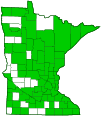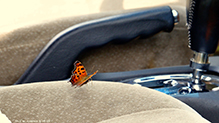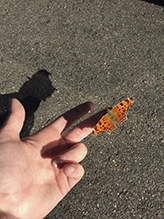Eastern comma
(Polygonia comma)
Conservation • Description • Habitat • Ecology • Distribution • Taxonomy
Conservation Status |
Photo by Greg Johnson |
||
IUCN Red List |
not listed |
||
NatureServe |
N5 - Secure S5 - Secure |
||
Minnesota |
not listed |
||
Description |
Eastern comma is a medium-sized angle-wing butterfly. It has a wingspan of 1¾″ to 2½″. The first generation each year (winter form) is noticeably darker than the second generation (summer form). The wings are noticeably angled rather than rounded. The outer margins are jagged and fringed in white. The tip (apex) of the forewing is curved backward (hooked). The hindwing is tailed. The tail of the winter form is long, that of the summer form is short. The trailing edge of the hindwing is noticeably ragged. The upper side of the forewing is reddish-orange with a broad dark margin band. The marginal band of the winter form is orangish-brown, while that of the summer form may be orangish-brown or black. There is a large black spot on the cell-end bar and 5 smaller black spots in the subapical area. The largest of these 5 spots, the one closest to the trailing edge of the wing, often has a pale black spot immediately above it. The upper side of the hindwing of the winter form is mostly orangish-brown, while that of the summer form is mostly black. There is a submarginal row of reddish-orange spots, and three medial and one postmedial black or orangish-brown spots. One of the medial spots is on the leading edge if the wing and is usually not visible on perched specimens. The postmedial spot is not visible in the black area of the summer form. On the male, the underside of both wings is irregularly banded with highly contrasted areas of light and dark grayish-brown and yellowish-brown. On females the banding is less prominent and the wings are more evenly colored. In the center of the hindwing there is a curved, silvery, comma-shaped line that is barbed at both ends. The eyes are brown. The caterpillar is variable in color and up to 1½″ long. Though fierce looking, they are harmless to the touch. The head has 2 short, dark, spiny projections (scoli) and numerous shorter white spines. The head and thorax are often black, sometimes the same color as the abdomen. The abdomen may be greenish-white, greenish-brown, or black. On pale individuals there is a broad, black, subdorsal stripe and black horizontal and oblique stripes on each abdominal segment. There are often red or orange spots above the spiracles. On the thorax and each abdominal segment there is a long, thick, stiff, branched scolus in the middorsal, subdorsal, supraspiracular, spiracular, and subspiracular regions. The scoli are usually yellow or greenish-white with black tips. The base of the leg-like structure (proleg) on each side of the middle abdominal segments is black or green. Mature caterpillars are found in June (summer form) and August to September (winter form). |
Size |
Wingspan: 1¾″ to 2½″ |
Similar Species |
Gray comma (Polygonia progne) is heavily striated on the underside of the hindwing and the inner half of the forewing. The comma on the underside of the hindwing is thin and tapered, not barbed, at both ends. Question mark (Polygonia interrogationis) is usually larger. The forewing apex is more strongly hooked. The trailing edge of the hindwing is more or less straight. The hindwing tail is shorter. The marginal fringe on the summer form is violet, especially on fresh individuals. There is an extra spot on the upper side of the forewing. The curved line on the underside of the hindwing is broken into a line and a dot, resembling a Question Mark. |
Habitat |
Open deciduous woodlands and woodland edges, swamps, marshes, streams; usually near water. |
Ecology |
Season |
Two broods: early April to mid-May and late June to mid-October. |
Behavior |
The caterpillar feeds at night on the underside of a leaf of a host plant. It creates a protective daytime shelter by folding under the sides of the leaf with silk. |
Life Cycle |
The females lay green eggs singly or stacked in chains or 8 or more on the underside of leaves or the stem of host plants. Winter form females lay eggs in early spring to the end of May. The larvae molt four times in 21 to 23 days before pupating. Winter form adults do not migrate. They overwinter in cold areas by hibernating in a bark crevice, the siding of a house, or other sheltered place. On warm winter days they may be seen flying. |
Larva Hosts |
American stinging nettle, small-spike false nettle, Canadian woodnettle, common hop, and Japanese hop; also elm. |
Adult Food |
Tree sap and rotting fruit. |
Distribution |
||
|
Sources 7, 21, 24, 27, 29, 30, 71, 75, 82, 83. Biodiversity occurrence data published by: Minnesota Biodiversity Atlas (accessed through the Minnesota Biodiversity Atlas Portal, bellatlas.umn.edu, 8/19/2025). |
|
| 8/19/2025 | ||
Occurrence |
||
Common |
||
Taxonomy |
|
Order |
|
Superfamily |
Papilionoidea (Butterflies) |
Family |
|
Subfamily |
Nymphalinae (Checkerspots, Anglewings, Peacocks, and Allies) |
Tribe |
Nymphalini (Ladies, Anglewings, and Allies) |
Genus |
Polygonia (commas) |
Subordinate Taxa |
|
|
|
Synonyms |
|
Polygonia dryas Polygonia harrisoni Vanessa comma |
|
Common Names |
|
Eastern Comma |
|
Glossary
Proleg
A fleshy structure on the abdomen of some insect larvae that functions as a leg, but lacks the five segments of a true insect leg.
Pupa
The life stage of some insects undergoing transformation. In caterpillars, the chrysalis.
Scolus
A spiny, branched projection from a larval body wall, the branches terminating with a single stiff, hair-like or bristle-like tip.
Spiracle
A small opening on the surface of an insect or arachnid through which it breathes.
Visitor Photos |
Share your photo of this insect. |
||
This button not working for you? |
||
Dan W. Andree |
||
Eastern Comma Butterfly,,, Here are a couple more photos of the same butterfly. One shows the underwing comma like marking. |
||
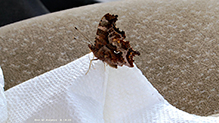 |
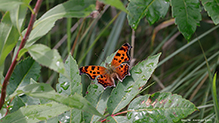 |
|
Zephyr butterfly in my car... This zephyr butterfly went in my car when I had the doors open to cool it off inside. It stayed in there for a bit until I finally walked around to the driver side and it flew out. Not sure what attracted it to go inside, but it had its proboscis probing on a paper town then the passenger seat area. I use the paper towels to wipe sunscreen off my hands because it smears up LCD's. Maybe it liked the scent of it. Not sure what kind of zephyr it is but it was a nice one. |
||
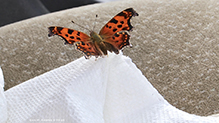 |
||
Greg Watson |
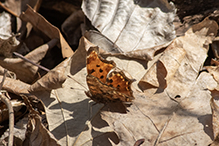 |
Jennifire4 |
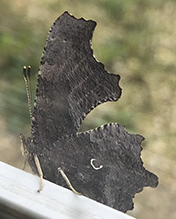 |
AKStern |
||
this was by my car when I walked out of the Fridley Home Depot store today. |
||
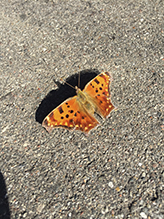 |
||
Robert Briggs |
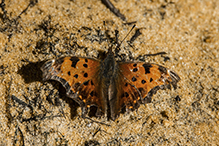 |
Picture of an Eastern Comma that I took today in Afton State park.... Kind of surprising - it seems awfully late in the year to be finding butterflies flitting around.... |
Greg Johnson |
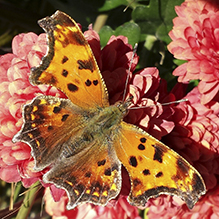 |
Tom Baker |
||
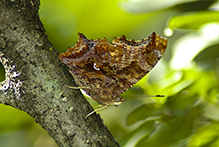 |
 |
|
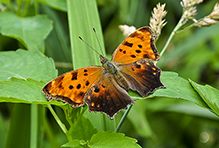 |
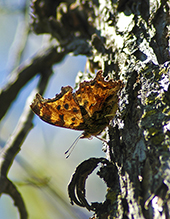 |
|
MinnesotaSeasons.com Photos |
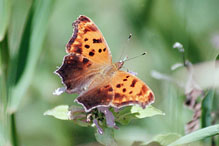 |
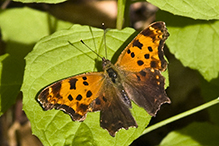 |
|
Summer form |
Summer form | |
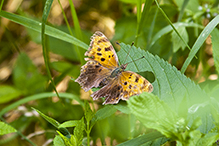 |
 |
|
Summer form |
Winter form | |
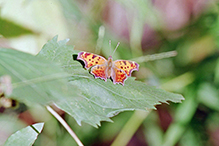 |
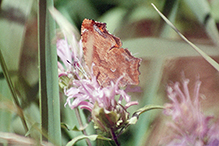 |
|
Winter form |
Underside |

Slideshows |
Eastern Comma (Polygonia comma) |
Polygonia comma (Eastern Comma) |
Eastern Comma |

Visitor Videos |
Share your video of this insect. |
||
This button not working for you? |
||
|
Other Videos |
Eastern Comma Butterfly (Nymphalidae: Polygonia comma) Sunning |
About
Uploaded on Sep 11, 2011 Photographed at the Turtle River State Park, North Dakota (11 September 2011). |
Eastern Comma (Nymphalidae: Polygonia comma) on Tree |
About
Uploaded on May 20, 2011 Photographed at the Turtle River State Park, North Dakota (19 May 2011). |

Visitor Sightings |
Report a sighting of this insect. |
||
This button not working for you? |
||
Dan W. Andree |
Location: MN SNA, Norman Co. Mn. … seen maybe 3-4 of these smaller ones. They seemed fresher looking and more of a bun shaped rounded top. Nice mushroom. |
 |
Greg Watson |
Location: Eagles Bluff Park, La Crescent, MN |
 |
| Jennifire4 9/18/2018 |
Location: West Lakeland Township |
 |
| AKStern 11/3/2016 |
Location: Fridley, MN this was by my car when I walked out of the Fridley Home Depot store today. |
 |
MinnesotaSeasons.com Sightings |

|
Created: 8/29/2005 Last Updated: © MinnesotaSeasons.com. All rights reserved. |
